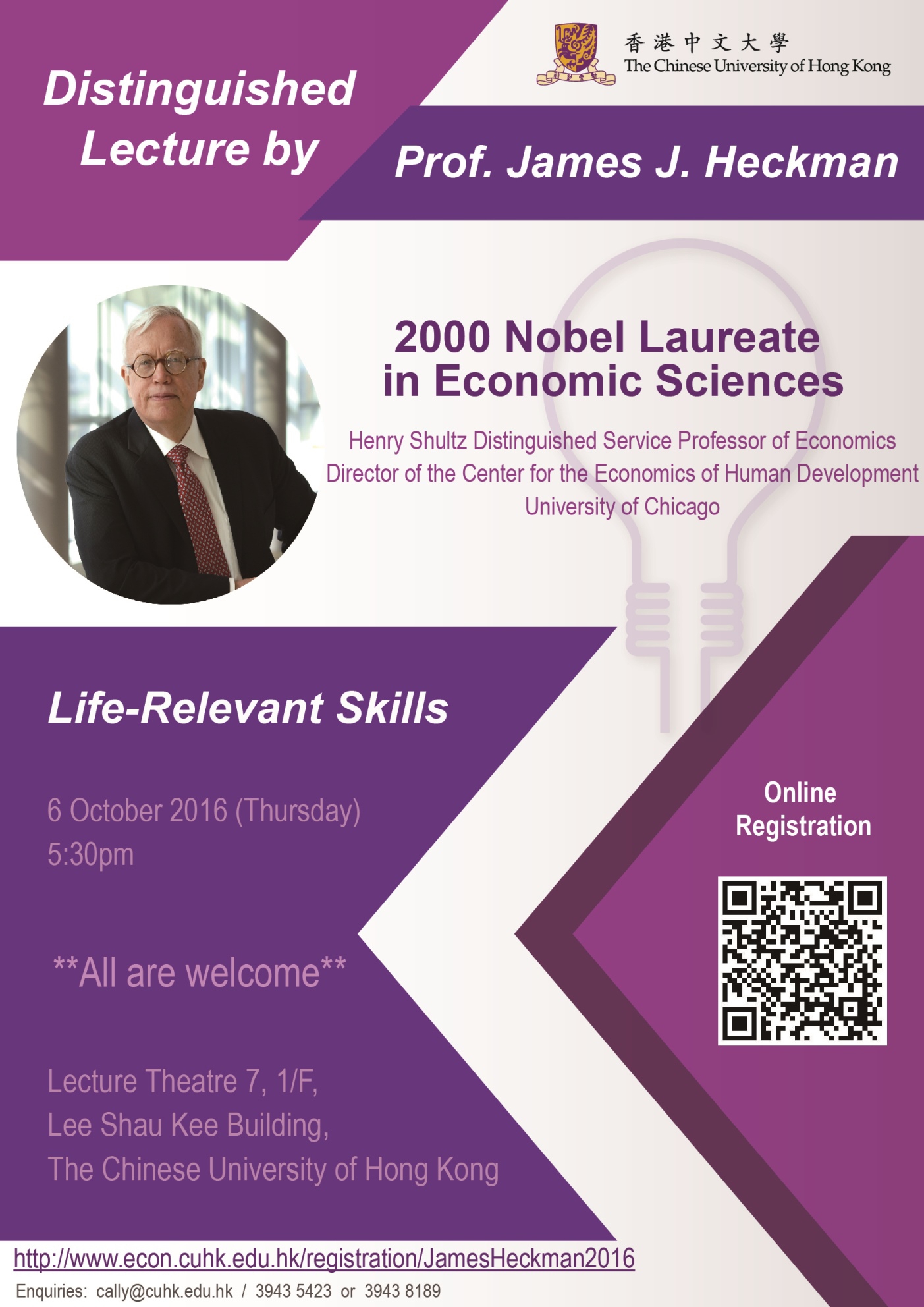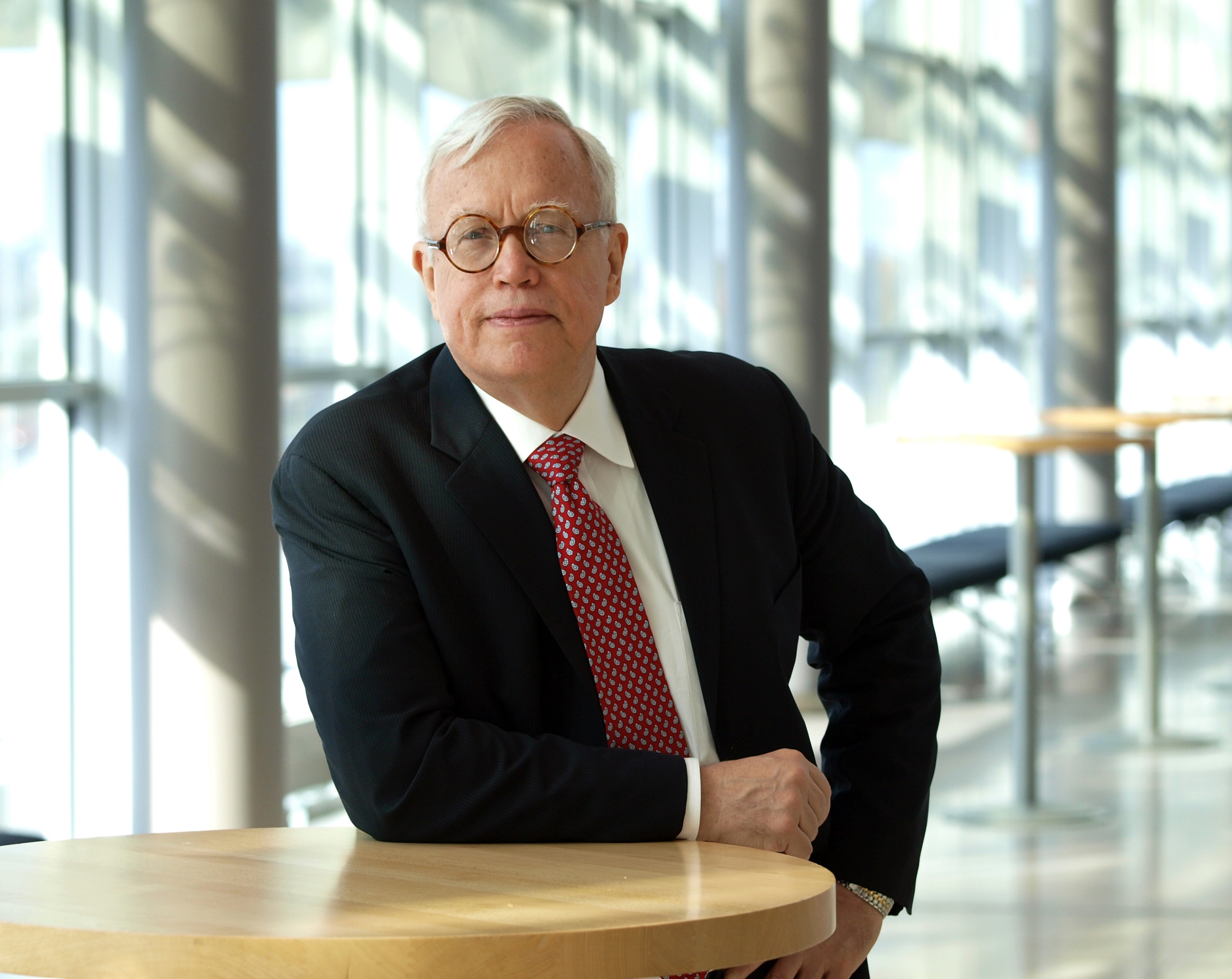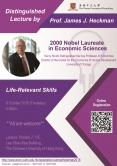CUHK
News Centre
Prof. James J. Heckman to Speak on ‘Life-Relevant Skills’ at CUHKPublic is Welcome
The Chinese University of Hong Kong (CUHK) will present a distinguished lecture on ‘Life-Relevant Skills’ delivered by Prof. James J. Heckman, 2000 Nobel Laureate in Economic Sciences, on 6 October, 2016 (Thursday). During the lecture, Professor Heckman will discuss the limitations of traditional methods in measuring students’ ability and introduce more predictive measures for evaluating life-relevant skills. Members of the public are welcome to join the lecture by registering online at http://www.econ.cuhk.edu.hk/registration/JamesHeckman2016.
In Asian societies, schools and parents always place great value on the various achievement tests, such as the Programme for International Student Assessment (PISA) and the Intelligence Quotient (IQ) test. However, from frontier research in psychology and economics, Professor Heckman argues such tests have very limited value in predicting a variety of life-relevant outcomes. Therefore, schools and teachers cannot fully understand students’ ability and assist in the whole person development of students. He will also discuss more predictive measures of life-relevant skills in the lecture. Frontier methods challenge and enhance traditional approaches to evaluating students, schools and entire societies.
Professor Heckman received his PhD in Economics from Princeton University. He has been at the Department of Economics at the University of Chicago since 1973. He is currently the Henry Schultz Distinguished Service Professor of Economics and Director of the Center for the Economics of Human Development at the University of Chicago. He is also a co-editor of the Journal of Political Economy. He has devoted himself to researches on the origins of major social and economic questions related to inequality, social mobility, discrimination, and the formation of skills and regulation in the labour market, and he has devised and applied economically interpretable empirical strategies for understanding and addressing these questions.
He specializes in inter-disciplinary researches on social inequality, social mobility and other social issues by applying knowledge from economics, psychology, genetics, epidemiology, neuroscience and law. He is also a leading authority on microeconometrics. His researches lay a foundation for evaluating the effectiveness of public policies.
Professor Heckman has achieved and contributed much of distinction in academia. In 2000, he won the Nobel Prize in Economic Sciences in recognition of his contribution to microeconometrics. He has also won numerous awards including the John Bates Clark Medal from the American Economic Association in 1983, the Jacob Mincer Award for Lifetime Achievement in 2005 from the Society of Labor Economics, the 2005 and 2007 Dennis Aigner Award for Applied Econometrics from the Journal of Econometrics, the Frisch Medal from the Econometric Society in 2014 for the most outstanding paper in applied economics published in Econometrica in the previous five years, the 2016 Dan David Prize and an NIH MERIT Award in 2010.
Professor Heckman is a member of the National Academy of Sciences, USA, a resident member of the American Philosophical Society, a fellow of the American Academy of Arts and Sciences, a fellow of the American Association for the Advancement of Science, a fellow of the Econometric Society, a fellow of the Society of Labor Economics, a fellow of the American Statistical Association, a fellow of the International Statistical Institute, and a member of the National Academy of Education. He has received numerous honorary degrees, and is a foreign member of several international scholarly bodies.
Professor Heckman has published over 300 articles and 9 books. In his most recent book ‘The Myth of Achievement Tests: The GED and the Role of Character in American Life’ published in 2014, he examines the nature of General Educational Development (GED) tests and analyses the limitations of such achievement tests in measuring students’ ability. His publications have significant impacts on both academia and government.





